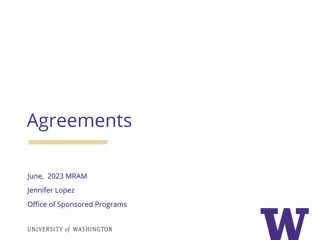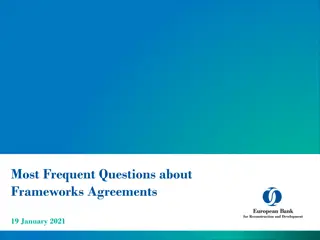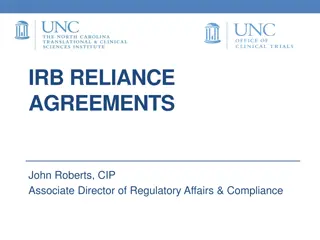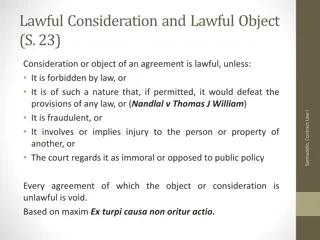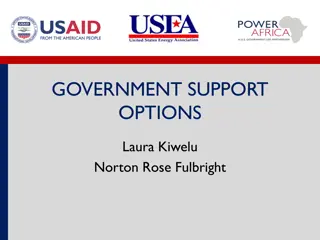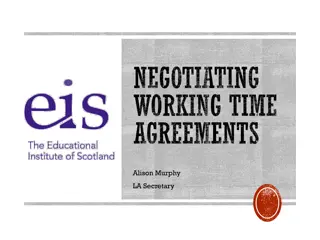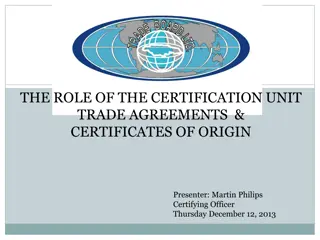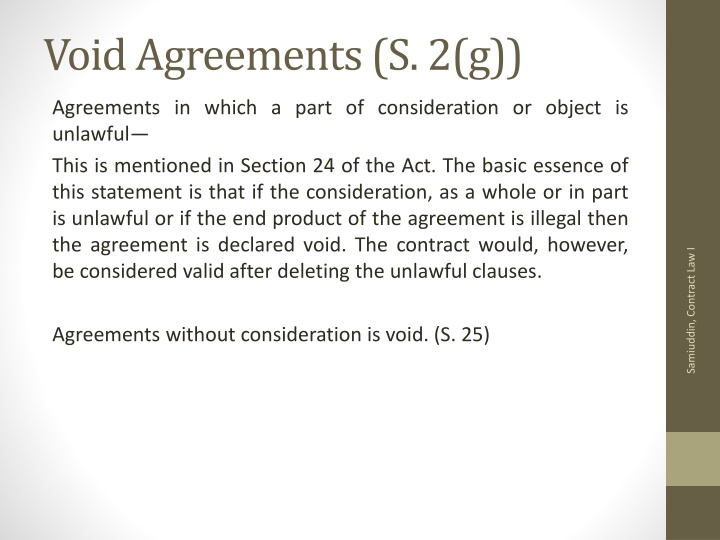
Void and Restraint Agreements in Contract Law
Explore the concepts of void agreements related to unlawful considerations and restraint agreements in contract law, as outlined in Sections 24, 25, 26, and 27 of the Act. Discover the implications of agreements in restraint of marriage, trade, and legal proceedings, along with exceptions in certain scenarios. Dive into case law examples and legal principles surrounding these agreements.
Download Presentation

Please find below an Image/Link to download the presentation.
The content on the website is provided AS IS for your information and personal use only. It may not be sold, licensed, or shared on other websites without obtaining consent from the author. If you encounter any issues during the download, it is possible that the publisher has removed the file from their server.
You are allowed to download the files provided on this website for personal or commercial use, subject to the condition that they are used lawfully. All files are the property of their respective owners.
The content on the website is provided AS IS for your information and personal use only. It may not be sold, licensed, or shared on other websites without obtaining consent from the author.
E N D
Presentation Transcript
Void Agreements (S. 2(g)) Agreements in which a part of consideration or object is unlawful This is mentioned in Section 24 of the Act. The basic essence of this statement is that if the consideration, as a whole or in part is unlawful or if the end product of the agreement is illegal then the agreement is declared void. The contract would, however, be considered valid after deleting the unlawful clauses. Samiuddin, Contract Law I Agreements without consideration is void. (S. 25)
Restraint of marriage (S. 26) Section 26 of the Act mentions that all agreements in restraint, either partial or full, of a marriage except that with a minor, would be void. For example, if Ria s father provides Amit with some incentives only to prevent him from marrying his daughter, then such an agreement would stand void in the eyes of the law, provided the parties involved are not minors. In the case of remarriage, any penalty imposed upon the widow wouldn t be counted as a restraint. This was held in the case of Rao Rani v. Gulab Rani, where it was held that the widow will have to forego her property rights. Samiuddin, Contract Law I
Restraint of trade (S. 27) This is dealt with under Section 27 of the Act. The freedom to practice any form of trade and occupation is a fundamental right guaranteed by the Constitution of India under Article 19(1). Hence, any agreement in restraint of trade and occupation would be deemed as void. The restraint can be both partial and complete. This was brought out in the case of Madhub Chander v. Raj Coomar, where the defendant had proposed to pay the plaintiff a certain amount of money if the latter agreed to shut down his shop in a particular locality. However, upon shutting down his shop, the plaintiff was denied payment by the defendant. The court here, ruled that the defendant did not own any money to the plaintiff since the agreement was void (as it was in restraint of trade), even though it imposed partial restraint i.e. extended to only a particular locality. Samiuddin, Contract Law I
Exceptions to this rule Sale of Goodwill Nordenfelt v Maxim Nordenfelt Guns and Ammunition Co Ltd. An agreement in restriction of trade is legitimate, if: There is a substantial interest that the party forcing the restriction is attempting to secure. The restriction is no more than what is important to secure this interest. Restriction isn t in opposition to public interest. Samiuddin, Contract Law I Partnership Act Section 11, which states that none of the partners would carry on any business till the continuity of the business. Section 36, which provides the remaining partners to prevent the outgoing partner from opening any business similar to theirs in the same locality subject to certain restrictions. Section 54, which prevents all the partners from engaging in any business of similar kind after dissolution of the firm/business. Trade Combinations
AGREEMENT IN RESTRAINT OF LEGAL PROCEEDINGS (S. 28) An agreement by which one party is debarred from enforcing his rights through legal proceedings. An agreement that places time-constraint for enforcing a legal right through legal proceedings. Samiuddin, Contract Law I EXCEPTIONS TO THIS PROVISION- (i) Contracts or agreements that refer any future dispute between two parties to Arbitration. (ii) Contracts or agreements that refer already existing questions or disputes to arbitration.
AMBIGUOUS and UNCERTAIN AGREEMENTS (Section 29) Certain agreements, the meaning of which is not unambiguous or capable of being made certain, are to that extent void. For a valid agreement, there must be no ambiguity between the parties about their rights and obligations. Ambiguity or uncertainty regarding the terms of the agreement shall render the contract void. Samiuddin, Contract Law I
WAGERING AGREEMENTS (Section 30) Agreements by way of wager are void and no suit brought for the recovery of anything alleged to be won on any wager, or entrusted on the result of any future/uncertain event is void to the extent of application of Section 30. Gherulal Parekh v Mahadeodas Maiya A Wagering agreement must satisfy the following essentials (Carlill v. Carbolic Smoke Ball Co.) The parties have opposite or polar views regarding the outcome of the uncertain event. There are opportunities of gain or loss to the parties on the determination of the event one way or other. The parties have no other interest except winning or losing. Samiuddin, Contract Law I
WAGERING AGREEMENTS & COLLATERAL TRANSACTIONS Even though a wagering agreement is void and unenforceable by law, it is not forbidden by law and hence the object of a wagering agreement is not unlawful as per the provisions of Section 23 of the Indian Contract Act, 1872. Samiuddin, Contract Law I The above principle was upheld by the Supreme Court in Gherulal Parekh v. Mahadeodas when it allowed for claims of one of the parties who were in a partnership for carrying on wagering agreements, and a claim was made for reimbursement of loss.
AGREEMENTS TO PERFORM AN IMPOSSIBLE ACT (S.56) Any agreement which entails the performance of an impossible task shall be void to the extent of its impossibility as per Section 56 of the Contract Act. Samiuddin, Contract Law I
Agreements contingent on impossible events void (S. 36) Contingent agreements to do or not to do anything, if an impossible event happens, are void, whether the impossibility of the event is known or not to the parties to the agreement at the time when it is made. Samiuddin, Contract Law I

![[PDF⚡READ❤ONLINE] Gemini 4: An Astronaut Steps into the Void (Springer Praxis B](/thumb/21620/pdf-read-online-gemini-4-an-astronaut-steps-into-the-void-springer-praxis-b.jpg)


